26 Oct 2017 | Bahrain, Bahrain Letters, Campaigns -- Featured, Statements
[vc_row][vc_column][vc_single_image image=”95197″ img_size=”full” add_caption=”yes” alignment=”center”][vc_column_text]Joint NGO letter to: Canada, Denmark, European Union External Action (EEAS), France, Germany, Italy, Norway, Sweden, Switzerland, United Kingdom, United States
We write to ask you to urgently raise, both publicly and privately, the case of Sayed Nazar Alwadaei, Hajar Mansoor Hasan and Mahmood Marzooq Mansoor with the Government of Bahrain ahead of the verdict in their criminal trial on 30 October 2017. These three individuals are relatives of Sayed Ahmed Alwadaei, a Bahraini human rights defender based in the United Kingdom, and his wife Duaa Alwadaei. Mr Alwadaei has been targeted by the Bahrain authorities for his human rights activism on numerous occasions and has been granted refugee status in the UK. We believe that Mr Alwadaei’s relatives are being prosecuted solely as a reprisal against him and the trial forms part of a pattern of harassment against his family.
On 26 October 2016, Mr Sayed Ahmed Alwadaei took part in a protest in London against King Hamad of Bahrain’s visit to the UK Prime Minister. Hours later, on the same day, his wife, Duaa Alwadaei, was detained along with her two-year-old son at Bahrain International Airport by Bahraini security forces. She was interrogated over seven hours and she was told she would not be allowed to leave Bahrain. During the interrogations, government officers reportedly made threats against her, her family and Mr Alwadaei’s family and she was told to deliver the threats as “a message to her husband.” Following international pressure and the intervention of the US embassy, on 1 November 2016 Mrs Alwadaei was able to leave Bahrain.
However, in March 2017, while Mr Alwadaei was attending the 34th session of the UN Human Rights Council in Geneva, Mrs Alwadaei’s brother Sayed Nazar Alwadaei, her cousin Mahmoud Marzooq Mansoor and her mother Hajar Mansoor Hassan were arrested in Bahrain. They all claim that they were subjected to ill-treatment, torture and extensively interrogated, including in relation to Mr Alwadaei’s life and work in the United Kingdom, without the presence of their lawyers. Mrs Hassan reportedly required hospitalisation on the first day of her detention. They were forced to sign confessions and were charged under Bahrain’s anti-terrorism law. If found guilty on 30 October, they face upwards of three years in prison each.
The treatment of the Alwadaei family has been the subject of international criticism. Six UN human rights experts raised “grave concerns” over the family’s allegations of torture, ill-treatment, arbitrary arrest and the apparent aim of the Government of Bahrain to “intimidate and impair Mr Alwadaei’s human rights activities”, including his participation at the UN Human Rights Council.
We therefore urge your government to request Bahrain to immediately release Mr and Mrs Alwadaei’s relatives ahead of their 30 October trial and drop all charges against them, and undertake prompt, impartial, independent and effective investigations into their allegations of torture and other ill-treatment. The findings of the investigation must be made public and anyone suspected of criminal responsibility must be brought to justice in fair proceedings. As this case is a part of a pattern of abuse and harassment against human rights defenders and their families in Bahrain, we urge you to call on Bahrain to cease all harassment of human rights defenders and their families.
Yours Sincerely,
Americans for Democracy & Human Rights in Bahrain (ADHRB)
Amnesty International
Article 19
Bahrain Centre for Human Rights (BCHR)
Bahrain Institute for Rights and Democracy (BIRD)
CIVICUS
English PEN
European Center for Constitutional and Human Rights (ECCHR)
European Centre for Democracy and Human Rights (ECDHR)
Gulf Centre for Human Rights (GCHR)
Index on Censorship
PEN International
REDRESS
Reporters Without Borders (RSF)
REPRIEVE[/vc_column_text][/vc_column][/vc_row][vc_row][vc_column][vc_basic_grid post_type=”post” max_items=”12″ style=”load-more” items_per_page=”4″ element_width=”6″ grid_id=”vc_gid:1509023634414-c2e4eb0c-cfba-5″ taxonomies=”716″][/vc_column][/vc_row]
17 Aug 2017 | Bahrain, Bahrain News, Middle East and North Africa, News and features
[vc_row][vc_column][vc_column_text]
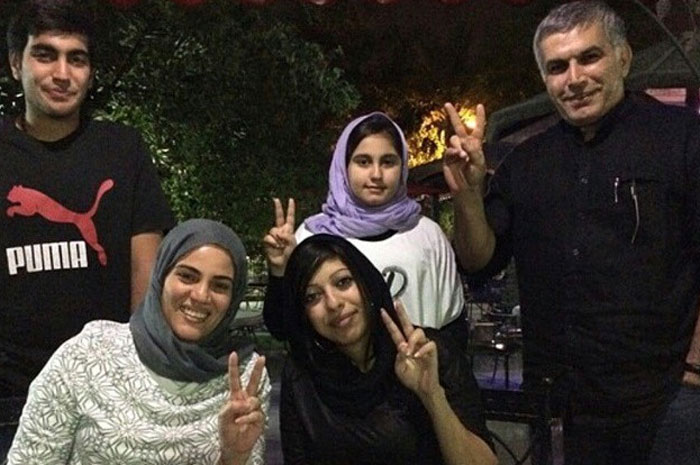
Back Row from left: Adam Rajab, Malak Rajab and Nabeel Rajab. Front Row from left: Sumaya Rajab and Zainab Alkhawaja. (Photo: Adam Rajab)
Human rights defenders often confront obstacles that make their work difficult. This is especially true in Bahrain, where the Sunni monarchy and government have been bent on silencing all opposition ever since the Arab Spring when tens of thousands of Bahraini citizens protested for democratic reform.
In recent months, the nation’s only independent news outlet, Al Wasat, was shuttered and prominent human rights activist Nabeel Rajab was sentenced to two years in prison for “spreading fake news”.
The families of activists suffer along with their loved ones and are often targeted with official harassment: detention, loss of employment, beatings and harassment. Each case is an individual story of a struggle for freedom.
A result of actions
Members of Sayed Ahmed Alwadaei’s family have been harassed and detained due to his ongoing campaigning for democracy and human rights in Bahrain. Most recently his mother-in-law and brother-in-law were detained while Alwadaei attended the United Nations Human Rights Council in March.
Alwadaei, director of advocacy at the Bahrain Institute for Rights and Democracy, is no stranger to detention: he was arrested twice in 2011 and served a six-month sentence in a Bahraini jail. He found asylum in the UK in July 2012. In February 2015, Alwadaei was among 72 Bahraini citizens to be stripped of their citizenship.
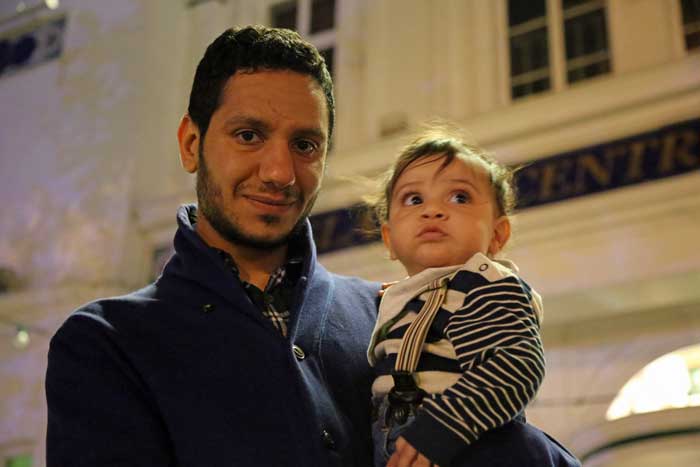
Sayed Ahmed Alwadaei with his son Yousif (Photo: Moosa Satrawi)
In October 2016, Alwadaei’s wife and infant son Yousif also faced official harassment as they tried to leave Bahrain to join Alwadaei in the UK. His wife was arrested at the airport and held overnight, during which time she was ill-treated. It was not until a few months later that she and her son were able to leave the country.
Other members Alwadaei’s family, including his sister, have also faced interrogations.
When asked how he continues campaigning under these circumstances, Alwadaei told index: “We can only get through this by sticking together and staying strong. It’s important to have a supportive family. The potential for arrest and torture is something they know and have to be willing to sacrifice.”
He added that he is balancing his efforts to get his mother-in-law out of prison while continuing his work in activism. “It’s hard but this is the right thing to do.”
“The oppression or torture aims to do one thing: to break your will because you’re not ready for the consequences,” Alwadaei said. “This is the state they want to leave you in. They want you to be broken and this is why we keep going.”
A life-long struggle
Maryam Al-Khawaja has been preparing for and participating in the struggle for human rights her entire life.
As a young child growing up in Denmark, she and her three sisters attended an English-speaking school, but the Al-Khawaja family knew they were only in the country temporarily. Her mother and father had been exiled for speaking out in Bahrain.
At a very young age, she remembers her parents asking her and her siblings before bed: “What have you done today to make the world a better place?” She told Index that her father wouldn’t help them answer the question because he wanted them to think about how the world could be. She remembers dinner conversations alive with politics and philosophical discussion about whether having false hope or no hope was better.
Around the 7th or 8th grade, Al-Khawaja knew wanted to be like her father when she grew up; she wanted to be an activist.
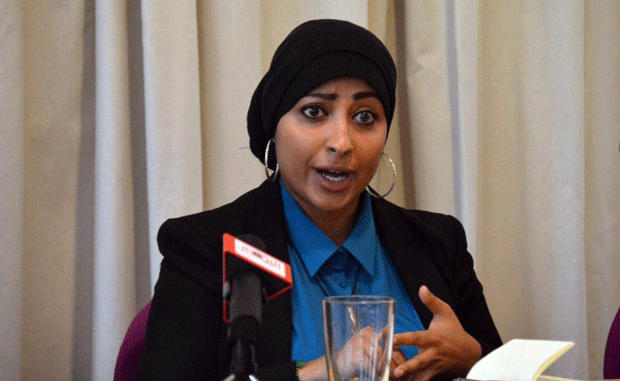
Maryam Al-Khawaja (Photo: David Coscia for Index on Censorship)
Al-Khawaja was 14 when her family returned to Bahrain in 2001. She recalls thinking her family was ready to take on the challenges and that the people of Bahrain would be ready to fight with them. But that was not the case. The country was tired of conflict and believed that the king’s promised reforms would be implemented. At the same time, activists were not popular among ordinary Bahrainis.
At college she said she was criticised by her classmates for speaking her mind about the state of their country, which caused her to lose interest in her father’s reform work. At the time, she asked him: “Why are you trying to change a situation for people who don’t want to change it for themselves?” His response was simple: “Someday you will understand.”
It wasn’t until 2011 during the Arab Spring protests that she developed a newfound respect for her father and was ashamed of herself for ever doubting him. She admits growing up in Denmark made her think fighting for human rights would be easy. When her father, along with 12 other leaders of the uprising, was arrested and sentenced to life imprisonment, she found that a life of campaigning isn’t so effortless.
During our conversation, Al-Khawaja jumped off the phone for a few minutes to take a call from her father. She had not heard from him in over three weeks and said their phone calls are always random and typically short as it is normal for the line to be cut if anything about the Bahrain government or any activist’s work is mentioned.
Until recently, her mother and sisters in Bahrain had not seen her father since February as their requests to visit have continually been denied. Al-Khawaja has not seen her father since 2014 as there are multiple fabricated charges against her that would mean imprisonment if she returned to the country.
Since her father’s imprisonment, Al-Khawaja and her older sister Zainab have been active in the push for human rights and freedom of speech in Bahrain. She says her father has two main characteristics as an activist: a fierce advocate and a fiery speaker. She explained that she and Zainab are the two parts to that whole: Al-Khawaja as the advocate and Zainab as the speaker.
Al-Khawaja said the work of her father and her sister Zainab has been tough for her two younger sisters. One sister had the highest scores in nursing school in Bahrain and graduation seemed to promise a job. But the paperwork from the government granting her access to work never came. She’s been waiting nearly eight years without a job. Al-Khawaja said it’s difficult for her family members when they’re in jail as they have to “take care of us when we cannot take care of ourselves”.
Her mother also felt the effects of the family member’s work when she was fired from her private school teaching job where she was the head of guidance.
A cause for celebrity status never wanted
Adam Rajab realised when he was young that his father Nabeel wasn’t like other dads. “I was so confused ‘why does my father work all day, while other fathers have certain working hours?,’” he told Index.
During a holiday he asked his father to take a break for a day. His father answered: “My colleagues are in prison. I can’t stop my work because they are suffering behind bars.”
In 2006, when Rajab was nine years old, he vividly recalls seeing his father come home bleeding from his head with a swollen and bruised back. “I was shocked and terrified but my father continued protesting like nothing had happened,” he said. “This was terrifying to me but the determination and fearlessness I saw in him really inspired me.”
In 2011 Nabeel Rajab’s work became well known. He appeared on TV and was the first activist to use social media to support the revolution then sweeping Bahrain. “Wherever we went, people would stop him and start taking pictures,” Adam said, adding that the strange situation was a shock to the family. “It started to become difficult because we couldn’t enjoy a private life like we used to.”
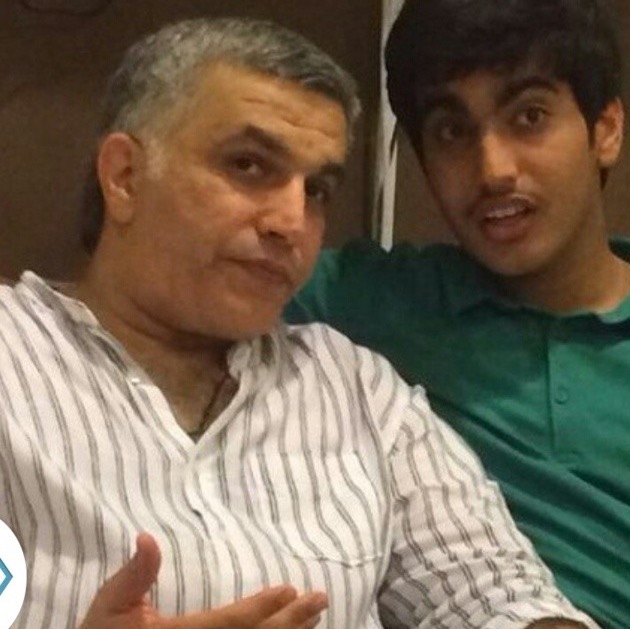
Nabeel Rajab with his son Adam Rajab
As a leader of the movement, Rajab’s father has become a face leaders around the world recognise but do little about. For years he has been in and out of jail. On 10 July 2017 he was sentenced to two years in prison for “broadcasting fake news”.
Although no one in the family has been arrested, his mother was harassed at her government job and then fired. Rajab and his sister have also faced harassment in school.
Rajab and his father have a very close relationship so the imprisonment has not been easy. “I haven’t seen him for more than a year now and he faces more charges which probably means more prison sentences,” Rajab said. “I find it difficult to enjoy anything while he is locked up in a cell and deprived of life, but as he taught me, the spirit is always up.”
Rajab wants his father to free and for them to live like any other ordinary family, but this does not take away from how proud he is or the strength of his belief in his father’s cause.
An open ended sentence
It’s difficult to imagine the emotions these activists and their families go through on a daily basis. A psychologist from the Refer Self Counselling Psychology Practice explained to Index that having a family member with a sentence with a sure release date is one case but when trials or release dates are postponed time and time again as they are in Bahrain, it is much more difficult. “We are rational problem solvers but not good with the unpredictable.”
The psychologist explained the situation in Bahrain is unlike what most with family members behind bars will ever experience. False hope puts an even greater emotional strain on loved ones.[/vc_column_text][/vc_column][/vc_row][vc_row][vc_column][vc_row_inner][vc_column_inner][vc_basic_grid post_type=”post” max_items=”4″ element_width=”6″ grid_id=”vc_gid:1503052292764-bb1a6c59-5e91-2″][/vc_column_inner][/vc_row_inner][/vc_column][/vc_row]
28 Apr 2016 | Bahrain, Middle East and North Africa, mobile, News and features
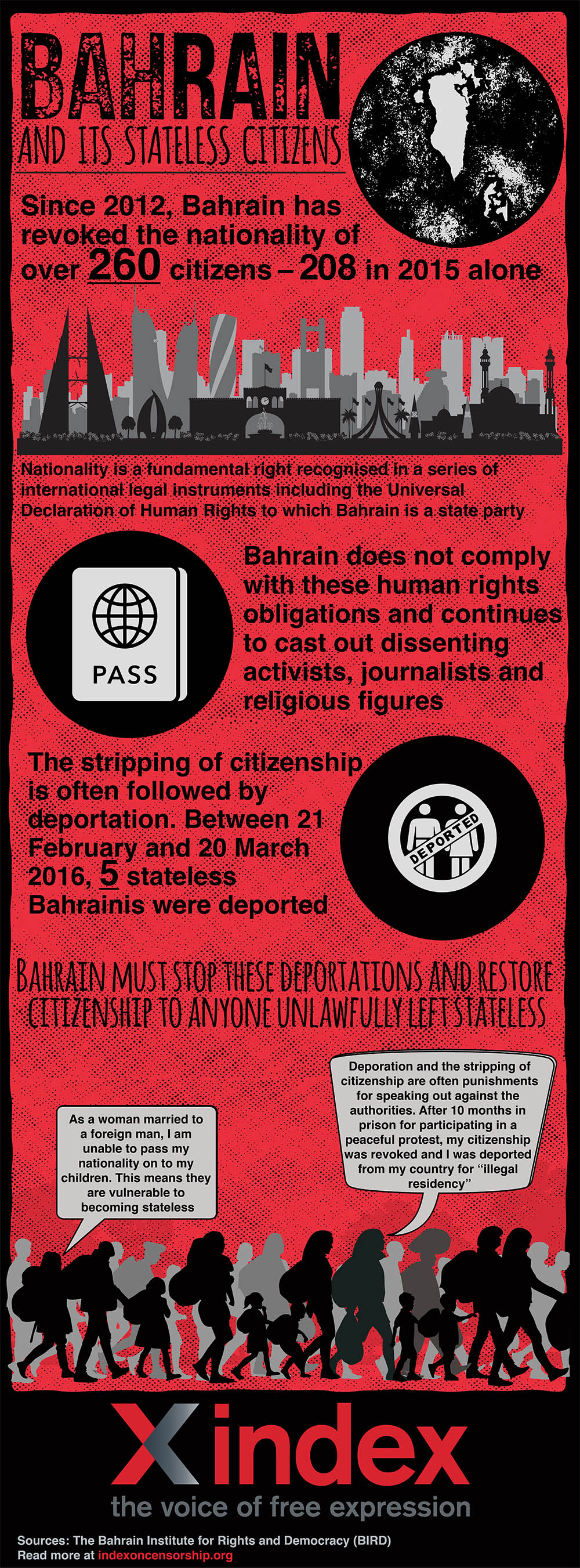
When we read about displaced people in the press, we usually hear about Syrian refugees fleeing IS or the one person per second displaced by natural disasters. We are less likely to be made aware of those who have become stateless through forced displacement.
Nationality is something most of us take for granted, but for the 10 million people worldwide who are effectively stateless, the issue is much less trivial.
Bahrain, in particular, has intensified the use of stripping citizenship from those who dissent or speak out in protest as a form of punishment. Since 2012 – when the country’s minister of the interior made 31 political activists stateless, many of whom were living in exile – 260 citizens have fallen victim, 208 in 2015 alone. Eleven juveniles, at least two of which have received life sentences, and 30 students are known to be among them.
Nationality is a fundamental right recognised in a series of international legal instruments, including the Universal Declaration of Human Rights and the International Covenant on Civil and Political Rights to which Bahrain is a signatory. The country repeatedly fails to comply with these obligations.
In 2014, new amendments to the country’s 1963 citizenship law further increased the power of the ministry of the interior and gave judges the authority to make anyone convicted under Bahrain’s anti-terrorism act, which fails to properly define terrorism, stateless.
In the case of Sayed Alwadaei, director of advocacy at the Bahraini Institute for Rights and Democracy (BIRD) and 71 others who were deprived of citizenship in January 2015, their “crimes” included vague terms such as “inciting and advocating regime change” to “defaming brotherly countries”.
Speaking to Index on Censorship, Alwadaei said: “Bahrain is setting up a dangerous precedent. No state has rendered as many of its citizens stateless in 2015. These revocations are politically motivated, and are becoming more common because they got away with it in 2012.”
“I was targeted because of my activism, and Bahrain considers human rights advocates as terrorists,” he added. “As I was not inside the country to face imprisonment, my nationality was the only way they could inflict pain on me. It was used as a tool to cause the maximum damage to stop my human rights work.”
While Alwadaei has not let the authorities take his identity, it does mean he is now stateless. “For my family, it means my infant son can’t have Bahraini citizenship, although his mother is also Bahraini.”
The danger for those made stateless inside Bahrain’s borders is that they do not have access to jobs, schools or health care and their bank accounts are closed, Alwadaei explains. “The people revoked of citizenship are at high risk of deportation by the court; many already have been under charges of ‘illegal residency’.”
These instances are also increasing. Between 21 February and 20 March 2016, five stateless Bahrainis were deported. One of these was Hussain Khairallah, whose citizenship had been revoked since 2012. He had been a union organiser and one of the medics who treated wounded protesters during the Bahrain’s Bloody Thursday in February 2011 when security forces launched a pre-dawn raid to clear a protest camp at Pearl Roundabout in Manama.
Anyone speaking out against the authorities faces such risks.
These practices and threats should immediately cease and all those who have fallen victim should have their citizenship restored. It is their right.





